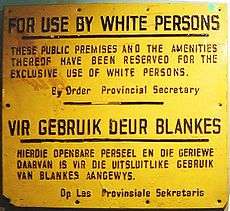California Proposition 14 (1964)
| Elections in California | ||||||||||
|---|---|---|---|---|---|---|---|---|---|---|
 | ||||||||||
|
||||||||||
|
||||||||||
| Part of a series of articles on Racial segregation | |
|---|---|
 | |
| South Africa | |
| United States | |
California Proposition 14 was a 1964 ballot proposition that amended the California state constitution, nullifying the Rumford Fair Housing Act. Proposition 14 was declared unconstitutional by the California Supreme Court in 1966. The decision of the California Supreme Court was affirmed by the U.S. Supreme Court in 1967 in Reitman v. Mulkey.
Rumford Fair Housing Act
The Rumford Fair Housing Act was passed in 1963 by the California legislature to help end racial discrimination by property owners and landlords who refused to rent or sell their property to "colored" people. It was drafted by William Byron Rumford, the first African American from Northern California to serve in the legislature. The Act provided that landlords could not deny people housing because of ethnicity, religion, sex, marital status, physical handicap, or familial status.[1]
Proposition 14
In 1964, the California Real Estate Association sponsored an initiative to counteract the effects of the Act.[2]
The initiative, numbered Proposition 14 when it was certified for the ballot, was to add an amendment to the constitution of California. This amendment would provide, in part, as follows:
Neither the State nor any subdivision or agency thereof shall deny, limit or abridge, directly or indirectly, the right of any person, who is willing or desires to sell, lease or rent any part or all of his real property, to decline to sell, lease or rent such property to such person or persons as he, in his absolute discretion, chooses.
The amendment attempted to re-legalize discrimination by landlords and property owners.
Following much publicity the proposition gained the endorsement of many large conservative political groups, including the John Birch Society and the California Republican Assembly. As these and other groups endorsed the proposal it became increasingly more popular and the petition to have the proposition added to the ballot garnered over one million signatures. This was more than twice the 480,000 signatures that were required. The initiative proved to be overwhelmingly popular, and was passed by a 65% majority vote in the 1964 California elections.[3]
Unconstitutionality
Soon after it was passed, the federal government cut off all housing funds to California. Many also cited the proposition as one of the causes of the Watts Riots of 1965.[4]
With the federal housing funds cut off and with the support of Governor Pat Brown, the constitutionality of the measure was challenged soon afterward. In 1966, the California Supreme Court did not consider whether Proposition 14 was unconstitutional because it violated the equal protection and due process provisions of the California Constitution; instead, it held that Proposition 14 violated the equal protection clause of the Fourteenth Amendment to the federal Constitution.[5] Gov. Brown's stance proved controversial; later in 1966, he was defeated in his bid for re-election by Ronald Reagan. Reagan was a supporter of Proposition 14 based on his view of property rights. Reagan labeled the Rumford Act as an attempt "to give one segment of our population a right at the expense of the basic rights of all our citizens."[6]
However, the case continued. The U.S. Supreme Court affirmed the California Supreme Court's decision in Reitman v. Mulkey (1967), holding that Proposition 14 was invalid because it violated the equal protection clause. The proposition was repealed by Proposition 7 in the November, 1974 election.[7]
Reitman established a significant precedent because it held that state assistance or encouragement of private discrimination violated the equal protection guarantee of the Fourteenth Amendment.
References
- ↑ Peniel E. Joseph (2006). The Black Power Movement: Rethinking the Civil Rights-Black Power Era. CRC Press. pp. 47–. ISBN 978-0-415-94596-7. Retrieved 8 January 2013.
- ↑ "Proposition 14". Time Magazine. September 25, 1964. Retrieved 2008-01-15.
- ↑ Robert O. Self (2003). American Babylon: Race and the Struggle for Postwar Oakland. p. 168. ISBN 0-691-07026-1.
- ↑ Alonso, Alex A. (1998). Rebuilding Los Angeles: A Lesson of Community Reconstruction (PDF). Los Angeles: University of Southern California.
- ↑ 64 Cal. 2d 529 (1966)
- ↑ Skelton, George (May 7, 2014) "Thank you, Donald Sterling, for reminding us how far we've come" Los Angeles Times
- ↑ California Voter's Pamphlet, General Election, Nov. 5, 1974